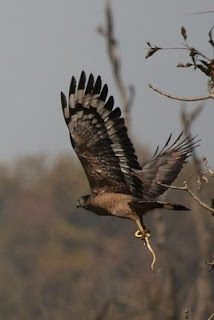
Regularly we get queries about elephant safaris in Kanha and Bandhavgarh. What used to be joy rides on Elephant back in these two parks in the afternoon have long been stopped. Now there is an interesting system called Tiger show on Elephant back, it has it's benefits and drawbacks. But before i delve into it, i would like to tell you how does it work.
In the morning, the domesticated elephants which belong to the forest department set out to track the Tiger. The expert mahouts who regularly track the Tigers normally succeed in finding the Tigers in the bush, it could be the Tigress with the cubs, or the cubs on a water hole, or a male Tiger on a kill. Once the Tigers are tracked by the Mahouts, they flash the message at the key camps, where the message is read by the drivers who are tracking the Tiger. They then take a token and report to the area where the Tiger is. Normally not more than 2-3 vehicles are allowed to be in the area where the Tiger is to avoid crowding and subsequent disturbance to the Tiger. Once your turn comes, you are asked on hop on to the Elephant and taken into the bush where the Tiger is. This is the closest you can get to a wild Tiger. You get an opportunity to click the Tiger and then you return to the area where your vehicle is standing. Your ride on the Elephant back normally lasts 3-5 minutes. But it is enough to get you good shots of the Tiger, if the tiger is obliging.
Now, the question arises, why is this system good. It is good, as tracking a Tiger in the huge forest is not always easy in a Jeep, so for a tourist who comes from few thousand miles this is a sure shot way of seeing a Tiger in the wild. Many a times the drivers and the naturalists are able to track the Tiger, but as Tiger is a highly territorial animal and also very elusive so it is extremely difficult to track the same. Also our Indian National Parks are not like the African parks which do not have so much of dense foliage, so while it is easy to track animals in Africa, in Indian National Parks it is challenging. Then the habits of tiger also do not help in easy tracking, unlike Lions, and Cheetahs which are found in a pride or a family, Tiger lives and hunts alone. No two big Tigers are seen together. Another important method used in Africa to track big game is use of wireless sets by the rangers in the Jeep, the same is not permitted in Indian National Parks. But please do not be disappointed, the fun is when despite all odds against you, the expert naturalists, drivers and Mahouts still track the Tigers. So, if you do not see the Tigers in your first drive, maybe second or third, please do not be disappointed, because you will forget everything once you spot your tiger in the Wild. In a normal three nights stay chances are extremely good of tracking Tigers from Jeeps itself. We do not guarentee Tiger sightings, as it is a Jungle out there, and one should realise the tiger sightings are a matter of calculated chance. But a 3 nights stay is a must at a Lodge which has good naturalists. Our naturalists and drivers at Chitvan, have had a 100% success rate in tracking Tigers from the Jeep.
Now, the reason why Tiger sightings from the Jeep are better than from Elephant back. A Tiger walking in front of your Jeep, or a one following your Jeep, is a far better photographic opportunity as a Tiger on the move is perhaps one of the most dynamic things you ever see in the forest. The angles that you get when taking a shot of a Tiger from the Jeep is much better, as it provides you with a depth of field which a Tiger photographer will die for. Though a Tiger is a Tiger, whether sitting or moving, but a moving Tiger is a much better sight compared to a relaxing Tiger.
So come, see for yourself these majestic, elusive, and most photographed mammals on the planet. Come once, as once you spot your first Tiger in the Wild, you will relate yourself with this extraordinary feline in a manner that you will come back again sooner than latter.
Cheers!
























